Park Beyond is a theme park sim with the best and weirdest rides
If your coaster doesn't shoot people out of cannons, what's the point?
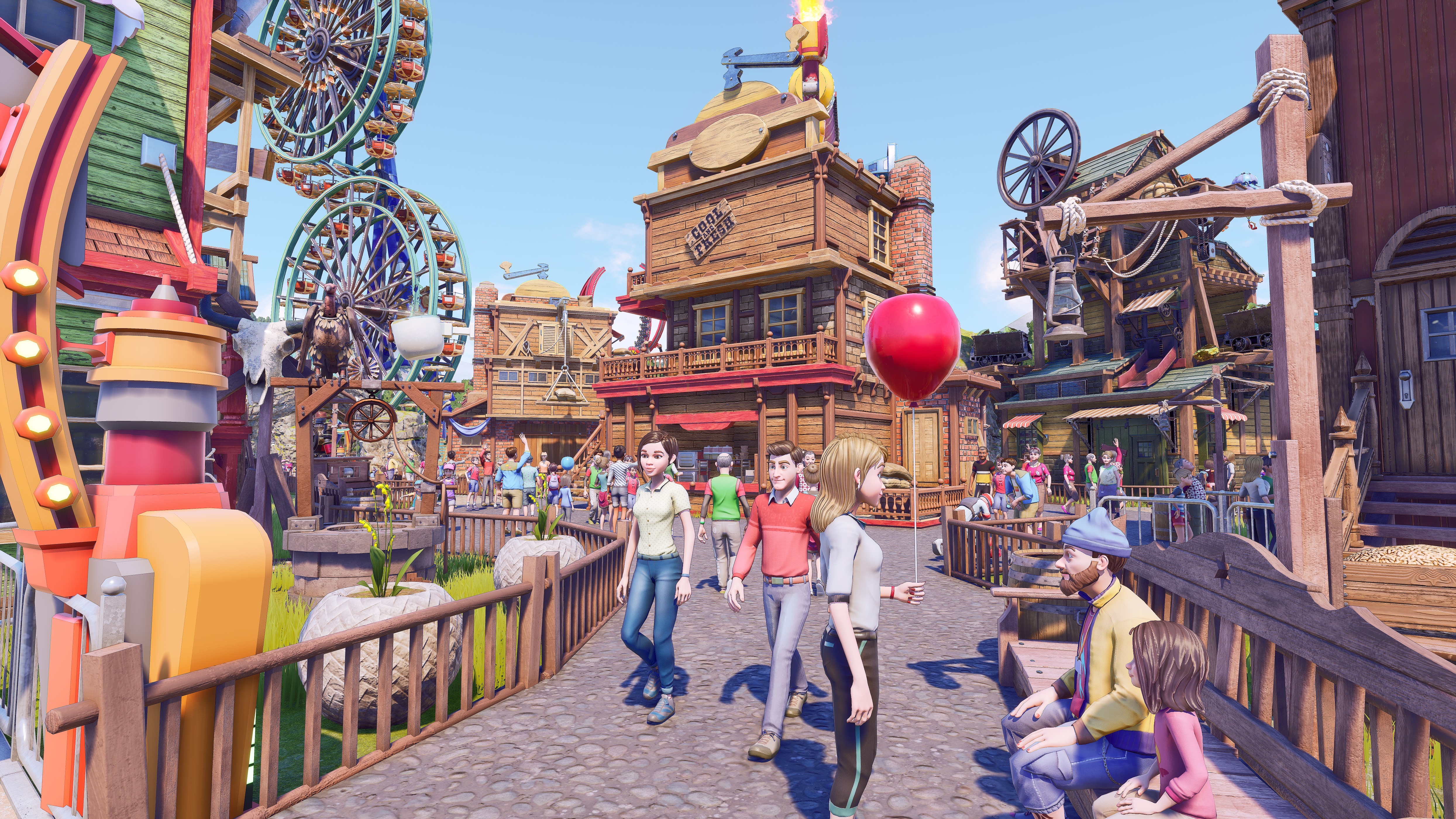
I missed out on my prime theme park years because I was deathly afraid of roller coasters. It wasn't until my late teens that I discovered that, no, I probably won't shoot off the tracks and towards my death. I'm now something of a coaster addict, but I'd still probably need a bit of encouragement to step onto one of Park Beyond's bizarro rides.
If you've watched the trailer, you'll probably have noticed a similar vibe to Planet Coaster, with its familiar aesthetic and tone. There's a failing park and some eccentric leadership, and they want you to fix it all up and make sure your cartoon guests are having a lovely time. To build your perfect park, you're free to go wild, using oodles of props and building parts to make your dream a reality. But Park Beyond takes things further. Instead of building the kind of park you'd like to visit, you can create something that could probably never exist in the real world, full of rides that border on the impossible.
Impossification is a made-up word that I hate, and a system that I might end up loving. The reason the park is failing is because nobody wants to ride the same old crap over and over again. It's the same reason that players might have been a bit disappointed if Park Beyond was just like Planet Coaster. That's where the impossification system comes into play.
You don't get a ride much more traditional and devoid of thrills than a Ferris wheel—despite their penchant for being targeted in action movies—but maybe there's a future where Ferris wheels are cool again. That's what Park Beyond imagines. Apply the impossification system to said Ferris wheel and you can transform it into a skyscraper-sized 10-wheel monstrosity. Or how about a carousel built on top of a carousel that's built on top of another carousel?
Developer Limbic Entertainment is no stranger to the wacky side of management games. The German studio took the reins of Tropico for the long-running dictator sim's latest entry, Tropico 6, and looks to be bringing the same tongue-in-cheek, anarchic energy to its first theme park romp.
"It's a general theme across the entire game," says Limbic CEO Stephan Winter. "It's not only tied to the rides. There's something happening with impossification in all aspects of the game. But I think the rides are a very iconic example. The core idea was, and maybe it sounds a bit naive, but if you go to a real theme park, it's selling you a dream. You go on a ride, and the ride is a promise: you're in a spaceship, or you're in a pirate ship. That's the promise to kids and adults."
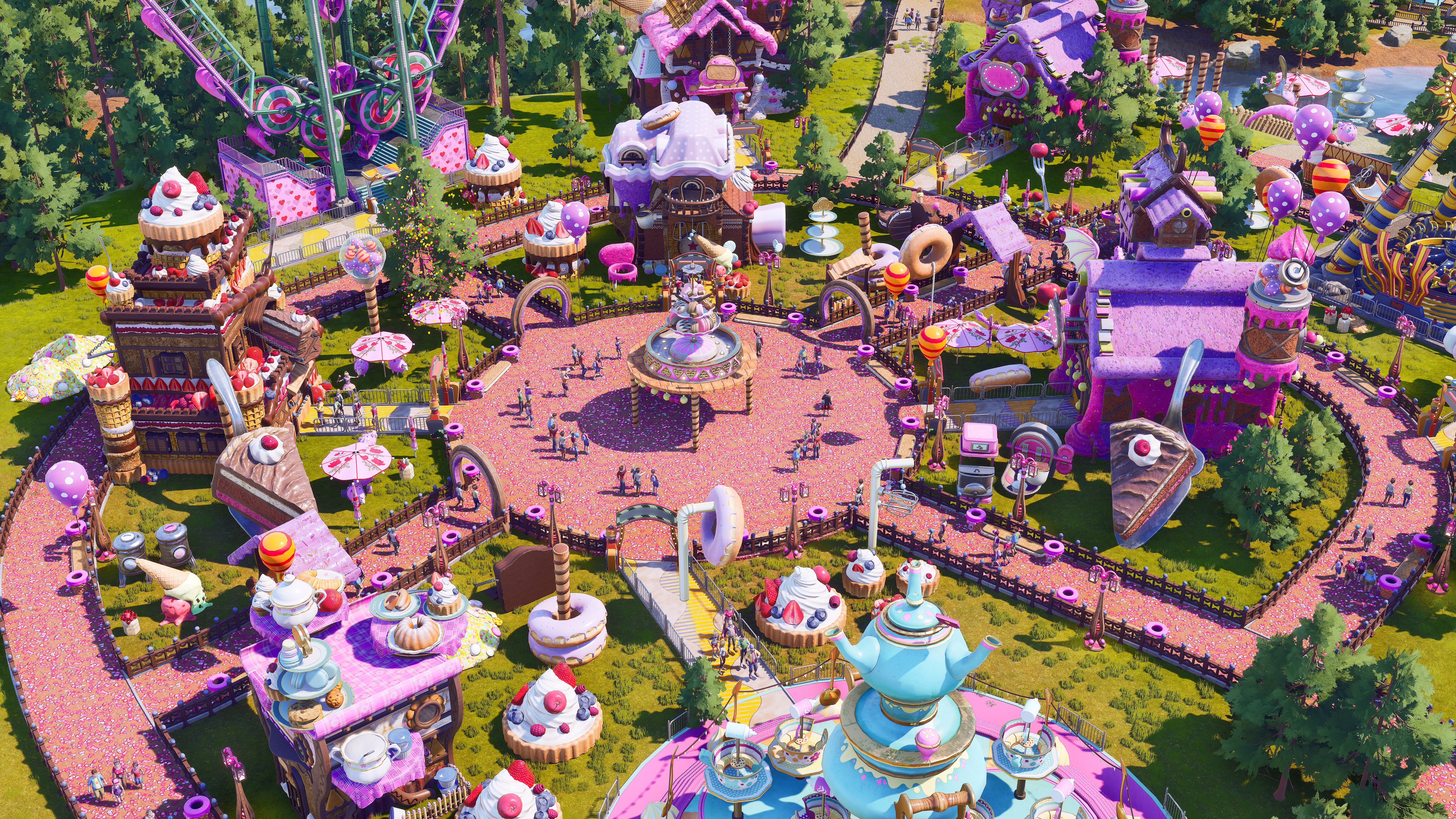
Think about the promo videos and art for theme park rides, and how they're always trying to break down the barriers between reality and fiction. You're hanging out with Spider-Man while he beats up villains, or sitting in a real spaceship trying to dodge lasers and enemy fighters. Real rides can't really live up to that, but Park Beyond's can. Limbic's taken the main characteristics of these rides, whether they're roller coasters or something more subdued, and then exaggerated them several times over. "We totally overdo it," adds Winter.
The biggest gaming news, reviews and hardware deals
Keep up to date with the most important stories and the best deals, as picked by the PC Gamer team.
You won't be building impossible rides straight away, however. You'll start with the basics, which will still make you money, and you'll want to build up your bank balance a bit before you start considering more ambitious projects.
"Think about this giant Ferris wheel," says design director Johannes Reithmann. "The maintenance costs of this are suddenly super huge. And it might even make a loss, this impossified Ferris wheel. But of course it creates this amazement for all these visitors who are riding it. And this is something you need to take as part of your economy. And you actually need to balance your money-making rides and your amazement-generating rides because you want in the end both—you need more money and you need more amazement for your research."
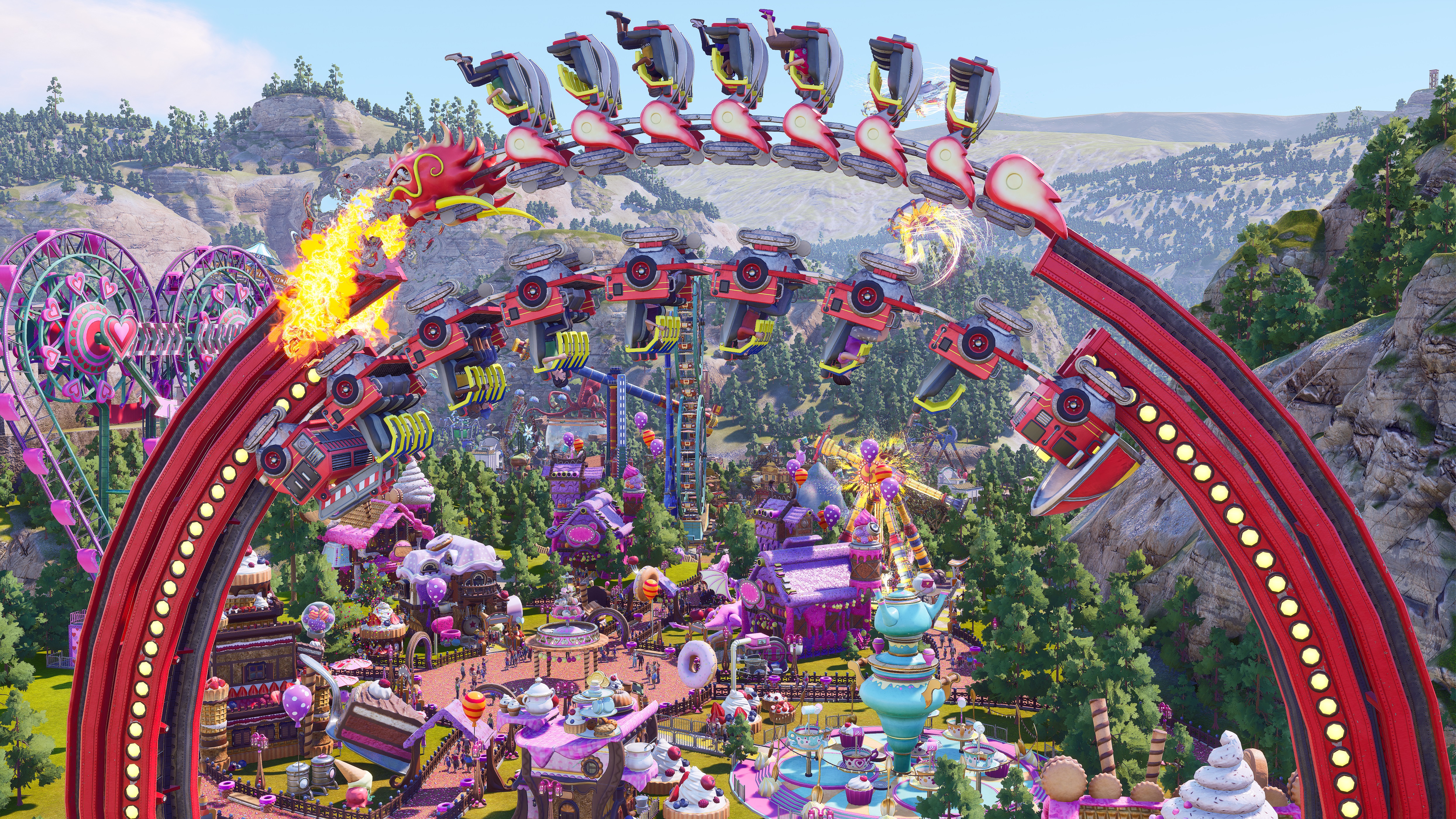
Amazement is also a key resource in the development of newer, weirder rides. When your guests look at your Frankenstein creations in wonder, that inspires the R&D team, in turn letting you unlock more modules for your rides. Just keep an eye on that budget.
Obviously the coasters are the main attractions. Since they're a bit more complicated to put together, there's an editing tool to help you plot out your wild ride, which Winter and Reithmann emphasise has been designed with accessibility in mind. Park Beyond is also going to launch on consoles, so effort has been made to ensure the control scheme is simple enough to work well with a gamepad. It's more like drawing a coaster than plonking down parts.
Even before you upgrade them, you can still create some pretty thrilling coasters, and even use the environment to create something spectacular, like one with a track that goes straight through the hole of a giant donut. But through the impossification system you can then add wackier bits and bobs, like cannons that shoot carts across gaps, and you can even customise the carts themselves, making them fly or hover over the water.
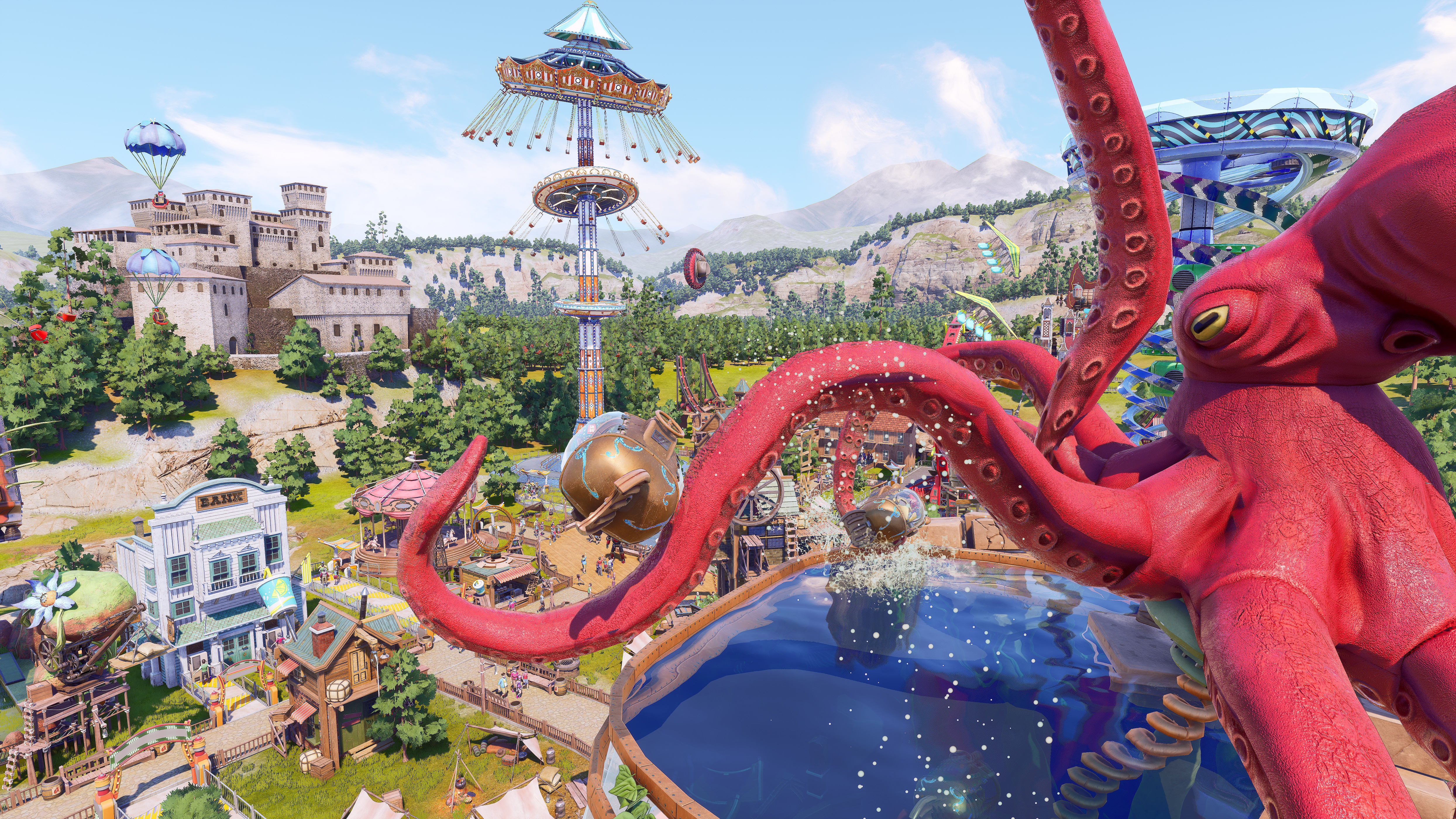
Despite all of this, physics is still the boss. "It still needs to be grounded in reality," says Reithmann. So even if you're creating big jumps or shooting guests out of cannons, you still need to take into account the momentum of the cart and the laws of reality. To make this easier, you'll see a ghost cart going down your work-in-progress coaster, highlighting any potential issues.
We wanted to make a theme park game that feels less like an editor and more like a real game.
Johannes Reithmann, Limbic Entertainment
"It was an interesting debate during the early pre-production because what we ultimately decided to avoid was magic," says Winter. "It sounds a bit weird to say this. I mean, lots of stuff is obviously not real, but there's still a difference between magically doing things like teleporting or whatever. And we didn't want to do very extreme sci-fi either. The best case is if you have this feeling that it could be believable. If we get to this spot, then it's actually pretty cool."
Along with the practical customisation of services and rides, there's also cosmetic customisation. Not only can you plonk down all manner of props or create your own buildings, there are themes that can dramatically change the appearance and appeal of your park. Limbic has shown off two so far, Candy Land and Wild West, but there will be more. These themes contain roads, shops, rides, textures, animatronics, characters and more. And you're not just limited to a single theme. You can create worlds within worlds, or just create something thematically ambiguous.
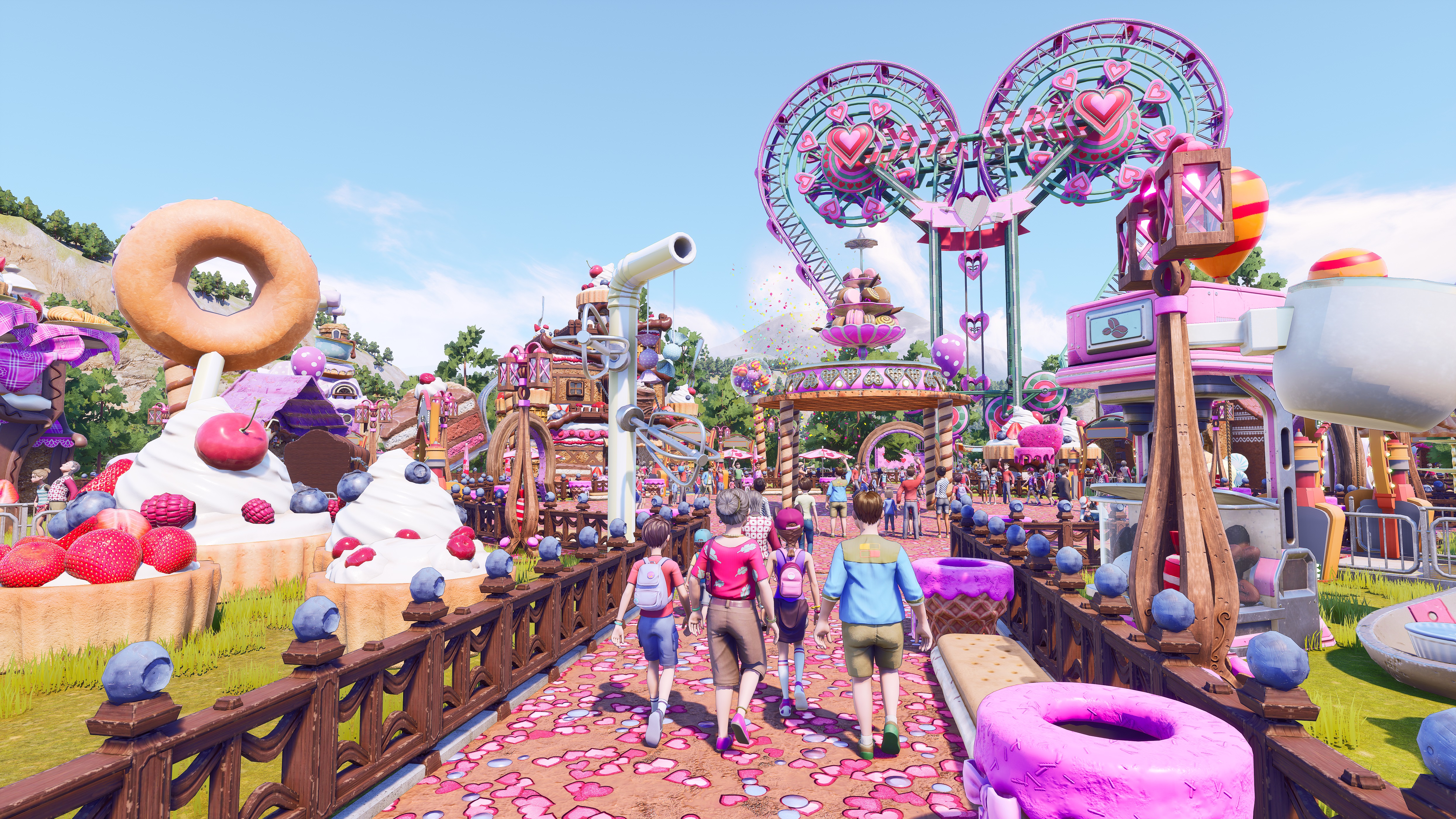
While some rides are designed with a theme in mind, you can still use whatever rides you want in your Candyland park, and then you can use themed props to make the ride fit the park better. So while there are some limitations, there are also solutions that will help you overcome them.
So you can expect plenty of tinkering, but giving players that much freedom is a balancing act. I'm a big fan of Planet Coaster and the more recent Planet Zoo, but not everyone cares for how much clicking and editing and general fiddling goes into making something that actually looks good. Limbic wants to avoid that pitfall. "Our core tagline for the production was that we wanted to make a theme park game that feels less like an editor and more like a real game," says Reithmann. This comes from the story campaign, the way you build coasters, and how the editors and tools have been designed with the sensibilities of toys instead of something like Unreal Engine or Photoshop.
Park Beyond has clearly been designed to let people exercise the creative part of their noggin, but you are also running a business. This friction is alluded to in the trailer, where you meet Phil, the veteran park owner, and Izzy, his level-headed COO. These are characters you'll deal with a lot in the story campaign, reflecting the imaginative and money-minded sides of the game, and you'll meet more allies and opponents as you play through it. You'll also need to pitch your dream park in meetings with execs before embarking on your mission.

"And you can believe me," says Winter, "as developers, you go to lots of pitch meetings with publishers with amazing ideas. And then you have to argue a lot about the money."
As well as perhaps being a little harrowing for designers who've experienced plenty of pitch meetings, it's also a pretty novel feature. Essentially, this is how you design your scenarios. These meetings determine all sorts of things, from what your main and sub objectives are to what research is unlocked at the start. So you could decide you're going to make a park specifically for families, and from there you have to figure out what you need. Maybe you'll ask for Candyland buildings to get you started. Scenario wrinkles and restrictions are also determined at these meetings, so you'll have to negotiate how long you'll have to meet your objectives and what your budget will be.
The holistic nature of pitching scenarios is very appealing. Instead of needing to make some arbitrary decisions, potentially without context if you've only just started playing, it seems like it will encourage you to think about the scenario as a whole as you build on your previous choices.

You've also got day-to-day management to worry about. Budgets, staff training, recruitment, unhappy guests, a hotdog stand that's not pulling its weight—making you and your guests' dreams come true requires a bit of graft. You'll be poring over charts and feedback and getting out your calculator, but you can also choose to leave that stuff in the background if you'd rather just muck around with rides.
"We discovered throughout our playtests that you have a big range of players and how they want to actually play the game," says Reithmann. "And this is also something we saw in this particular genre as especially important because we have these creative, very creative players who do not want to be bothered with setting prices for burgers. And on the other hand, there are core management players who love the roleplaying fantasy of being the boss of this theme park and actually managing and tweaking all the little wheels. I think we did a lot of different things to accommodate all these players, and even the in-betweens, so these extremes actually have fun."

Between the story campaign, the scenario-designing pitch meetings and the customisable sandbox mode, Limbic reckons it has all the angles covered, whether a player wants to spend hours min-maxing or just wants to make the best-looking Wild West park out there.
I've been known to balance a budget on occasion, and I love the concept of pitching my dream park to set my own challenges, but it's definitely the impossification system that's got me excited about this one. I'm already dreaming of the weird shit I'll be subjecting my guests to when Park Beyond launches in 2022.

Fraser is the UK online editor and has actually met The Internet in person. With over a decade of experience, he's been around the block a few times, serving as a freelancer, news editor and prolific reviewer. Strategy games have been a 30-year-long obsession, from tiny RTSs to sprawling political sims, and he never turns down the chance to rave about Total War or Crusader Kings. He's also been known to set up shop in the latest MMO and likes to wind down with an endlessly deep, systemic RPG. These days, when he's not editing, he can usually be found writing features that are 1,000 words too long or talking about his dog.

